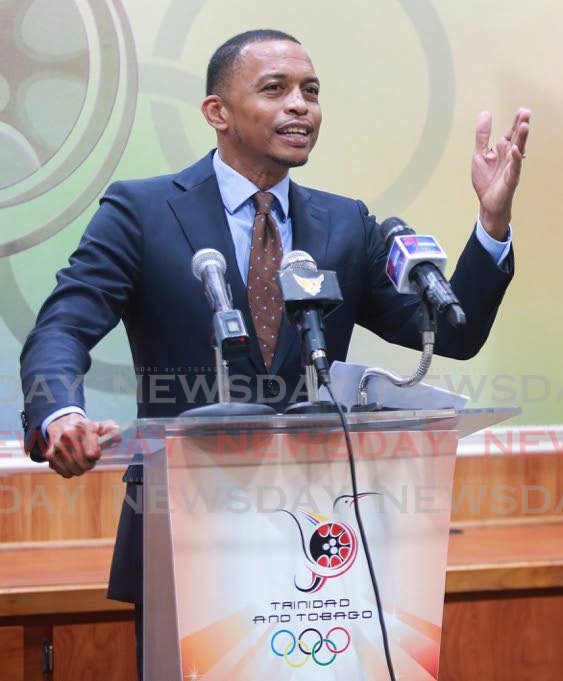TT Olympic Committee (TTOC) president Brian Lewis has called on sports administrators to sacrifice some of their privileges and redirect their interests toward a more athlete-centred approach.
Lewis made these comments during Thursday’s online talk show Coffee Talks which was held by Cartan Global – a world-renowned organisation in the sports and hospitality industry.
The Caribbean Association of National Olympic Committees (CANOC) president highlighted that many athletes who strive to reach the Olympic podium sacrifice their careers, health, family and friends.
While he commended sports administrators on their many works preparing athletes behind-the-scenes, Lewis believes some of their unnecessary perks and gratuities should be shifted towards helping athletes – “the real workers” – reach their full potential.
“We don’t address the fact that the pursuit of the Olympic dream and Olympic podium dream consigns many athletes to poverty. If they want to aspire to make the podium they can no longer do it recreationally.
“Why must athletes do this for free, sacrifice everything, while sports administrators and leaders stay at five-star hotels and get per diems? This was one of the reasons I created the Athlete Medal Bonus for our Olympic podium placing athletes,” he said.
In 2015, the TTOC head introduced a ‘cash for medals’ initiative which started at the Pan American Games that year. This medal bonus was implemented to encourage local athletes to raise their game and have an additional incentive to perform at their best ability.
The incentive is part of the ‘10 Olympic Golds by 2024 initiative’ and serves as a signal to the athlete that the TTOC is serious about creating a high-performance environment for athletes to succeed.
“These are the things we need to look at. Maybe we need to sacrifice some of the privileges and lifestyle of sport administrators. We can use the savings to afford our athletes, especially those who excel by virtue of the podium, be afforded some sort of financial dignity,” he added.
Since his introduction into sports administration in the early 90s, Lewis has always been actively involved in executing several athlete-centred initiatives.
Now in his final year at the helm of the TTOC, the former TT Rugby Football Union public relations officer continues to advocate about gender equality, gender-based violence and racial and social discrimination.
He also launched the Future is Female campaign which highlights the importance of allowing women more seats at the decision-making table to carry sport forward.
Lewis revealed that he grew up without a father and was surrounded by women who bore the brunt of society’s injustices to simply get by.
After serving several years serving as TTOC general secretary, Lewis was elected president in 2013. He concludes his eight-year, two-term reign at the close of the 2021 Olympic Games in Tokyo, Japan.
“Part of my vision I articulated was a transformative one. It was built on three pillars; being market-oriented, market centred and athlete-centred and I also focused on good governance. It also entailed gender equality and gender equity.
“I have tremendous respect for women and what they can do. Their resilience and how resolute they are.
“I saw my mother make do and bring up four children and turned whatever little she may have had into a positive,” he added.
During his ongoing tenure, Lewis made a deliberate and intentional effort to make the TTOC gender equal. When he arrived, there were just three women serving on the national Olympic committee (NOC). To date, there’s 11 serving in crucial roles.
He has been very vocal that the next TTOC, CANOC, Panam Sports, International Olympic Committee (IOC) presidents should be female, although subject to the democratic process.
Since the inception of these fraternities, a female has never been at the helm. According to Lewis, there’s a glaring omission.
“There are pros and cons in everything. But I generally believe that if you have more women at the decision-making table of global sport, you would have less controversy. It’s a symptom.
“It goes back to sexism, racism and institutionalised discrimination on the basis of race and gender.
“It goes back to the very origins of European dominance in the world. Of which sport is also the part of,” he continued.
Lewis concluded, “While the IOC has done a lot of work with gender equality n the field of play with the athlete, and while they have made progress in the boardroom, there is still a lot of work to be done. There is no room for complacency. The sporting world has been an old boys club and the succession planning pipeline is full of men.
“Because of the patriarchy that surrounds sport for centuries, being old male and white. There is need also for men. It can’t be a woman only battle. Men in the Olympic Movement must be sincere and genuine in supporting and advocating that vision. It may mean that some men will have to make a decision to push forward women on merit.”

